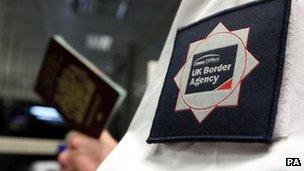Immigrants 'have to earn £35,000' to settle - from 2016
- Published

The government has pledged to cut net migration to the "tens of thousands"
Migrant workers will need to earn at least £35,000 to qualify for settlement in the UK, says the Home Office.
Home Secretary Theresa May said the change - from April 2016 - would help cut the number of non-Europeans and their dependants granted settlement each year from 60,000 to 20,000.
The pay threshold will apply to people wanting to remain permanently after more than five years working in the UK.
Those who don't qualify will be ordered to leave the UK after six years.
The pay threshold is the first time that a British government has imposed an economic test on the right to settlement in the UK. For decades, settlement has been granted on the basis of length of time living in - and ties to - the UK, recognising that people who have been living in the country for five years have made it their permanent home.
Prime Minister David Cameron says he wants to reduce annual net migration to "tens of thousands" from the current level of around 250,000.
It is aiming to bring the figure, which includes students and the families of visa holders, to below 100,000 by 2015 - a year before the latest restriction is due to come into force.
'Brightest and best'
In a written statement to Parliament, Mrs May said: "Until now, settlement has been a virtually automatic consequence of five years' residence in the UK as a skilled worker. Those who have settled have tended to be less well paid and lower-skilled than those who have not.
"And the volumes of migrant workers settling have reached record levels in recent years."
According to official figures, in 1997 fewer than 10,000 migrant workers and their dependants were granted settlement, but by 2010 this had risen to 84,000.
Mrs May said: "So in future, we will exercise control to ensure that only the brightest and best remain permanently."
The £35,000 earnings threshold will be waived for any "shortage occupations" if official advisers tell ministers that the UK needs more workers with skills or training.
Scientists and researchers in PhD level jobs will also be exempt from the earnings test.
Nicola Dandridge of Universities UK, said: "The government has responded to the concerns... by exempting PhD-level jobs from the new pay threshold for settlement.
"We argued strongly that such international academics and researchers should be made exempt from any pay threshold on the basis that their salaries are not comparable to those of highly skilled migrants working in other sectors.
"If we are to continue to produce Nobel Prize-winning research and groundbreaking work, we must offer a welcoming environment to the best academics from around the world."
The government says it will also restrict the arrival of foreign domestic workers to those who are travelling with their employers, such as diplomats or business people temporarily working in the UK.
Mrs May said: "We recognise that the ODW (overseas domestic worker) routes can at times result in the import of abusive employer/employee relationships to the UK.
"It is important that those who use these routes to bring their staff here understand what is and is not acceptable. So we will be strengthening pre-entry measures to ensure that domestic workers and their employers understand their respective rights and responsibilities."
Under the new rules, overseas domestic workers who come to the UK with their employer must leave after six months. Those working in diplomats' households can stay for up to five years. The workers will not be able to extend their stay, switch employer, sponsor dependants or seek settlement.
Shadow home secretary Yvette Cooper said of the new salary cap: "People should only be allowed to settle in this country under these rules if they can pay their way, live by our rules and contribute value to our country. We need strict controls, properly enforced, and all of the mainstream parties should agree on that.
"However, there is still a massive gap between the Tory-led Government's rhetoric and reality. New rules will have no impact if they are not properly enforced."
Migration 'bounce' warning
UK Independence Party home affairs spokesman, Gerard Batten MEP, said the government was "posturing" on immigration because any measures cannot apply to EU citizens.
He said: "The solution is for Britain to take back control of its immigration policy so that we can decide who we admit, for how long, and under what conditions. We can only do that we leave the EU and repudiate the European Court of Justice."
The government says it is making progress towards its plan to cut net migration to tens of thousands a year - the balance between those arriving and those leaving.
But on WednesdayOxford University experts predicted, externalthat even if ministers hit the target by the end of the Parliament, net migration could very quickly "bounce" up again.
Researchers at the Migration Observatory said current cuts were affecting groups of migrants who were less likely to stay in the UK for the long-term, such as students.
In turn, that meant that the UK would start receiving proportionally more migrants who would want to settle for the long-term than leave. If that happened, said the report, migration cuts would "essentially evaporate" following 2015.
- Published28 February 2012
- Published25 January 2012
- Published10 January 2012
- Published1 January 2012